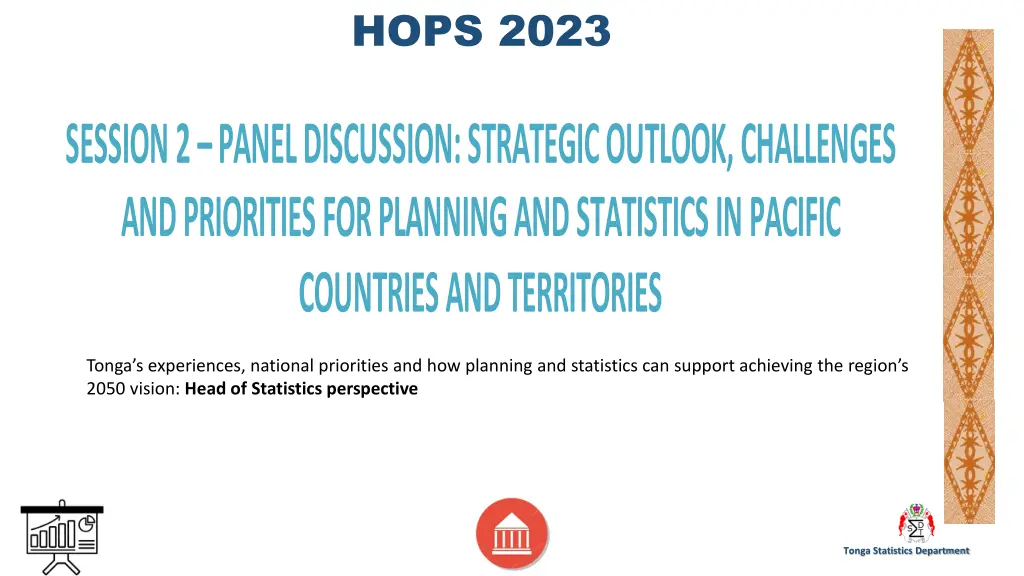
Strategic Planning and Statistics for Pacific Countries: Tonga's Perspective
Explore Tonga's strategic outlook, challenges, and priorities in utilizing planning and statistics to support the region's 2050 vision. Discover how data-driven decision-making, monitoring progress, identifying priorities, stakeholder engagement, capacity building, and international reporting play key roles. Gain insight into the unique challenges faced by Pacific countries, including data accessibility, inclusivity, data innovation, geographic dispersal, limited resources, data fragmentation, and climate change impacts.
Download Presentation

Please find below an Image/Link to download the presentation.
The content on the website is provided AS IS for your information and personal use only. It may not be sold, licensed, or shared on other websites without obtaining consent from the author. If you encounter any issues during the download, it is possible that the publisher has removed the file from their server.
You are allowed to download the files provided on this website for personal or commercial use, subject to the condition that they are used lawfully. All files are the property of their respective owners.
The content on the website is provided AS IS for your information and personal use only. It may not be sold, licensed, or shared on other websites without obtaining consent from the author.
E N D
Presentation Transcript
HOPS 2023 SESSION 2 PANEL DISCUSSION: STRATEGIC OUTLOOK, CHALLENGES AND PRIORITIES FOR PLANNING AND STATISTICS IN PACIFIC COUNTRIES AND TERRITORIES Tonga s experiences, national priorities and how planning and statistics can support achieving the region s 2050 vision: Head of Statistics perspective Tonga Statistics Department
HOPS 2023 A. Tonga s experiences, national priorities and how planning and statistics (work together) can support achieving the region s 2050 vision: Head of Statistics perspective. Tonga, like many other countries, has set ambitious long-term goals to improve the well-being of its citizens, promote sustainable development, and address various challenges it may face. Planning and statistics play a vital role in shaping and monitoring progress toward these objectives. 1. Data-Driven Decision-Making: Planning for Tonga's future requires informed decision-making. High-quality statistical data provides the foundation for evidence-based policymaking. 2. Monitoring Progress: The statistical office can create performance indicators and benchmarks to measure progress towards specific targets set in the 2050 vision. Regular reporting and analysis of these indicators can highlight areas where additional interventions are needed and identify successes that can be scaled up. 3. Identifying Key Priorities: Statistics can help identify the most pressing issues and priorities that need attention in achieving Tonga s vision Tonga Statistics Department
HOPS 2023 4. Stakeholder Engagement and Capacity Building: Accurate data can help build trust and collaboration among stakeholders, which is essential for achieving common goals. Building data literacy and statistical skills across various sectors will empower decision-makers to use data effectively in their planning and policymaking processes. 5. International Reporting and Accountability Statistics play a significant role in reporting on progress to international bodies and donors. Ensuring that Tonga meets its international reporting commitments helps maintain its standing in the global community B. Strategic outlook, challenges and priorities for planning and statistics in Pacific Countries and territories From the perspective of a Head of Statistics in Pacific countries and territories, it's essential to have a strategic outlook that addresses the unique challenges and priorities in this region. 1. Data Accessibility and Quality: To improve the accessibility and quality of statistical data. This includes investing in technology and capacity-building to collect, analyze, and disseminate accurate and timely data. Tonga Statistics Department
HOPS 2023 2. Inclusivity Ensure that data collection methods and analysis are inclusive, considering the diverse populations, languages, and cultures across the Pacific 3. Data Innovation Embrace modern data collection methods, including the use of technology and data analytics, to enhance the efficiency and effectiveness of statistical operations. Challenges: 1. Geographic Dispersal: The vast geographical spread of Pacific countries and territories presents logistical challenges in data collection and dissemination. Remote and isolated areas can be difficult to reach. 2. Limited Resources: Many Pacific nations face resource constraints, including budgetary limitations and a shortage of skilled statisticians. 3. Data Fragmentation: Data can be fragmented across various government departments and agencies, making it challenging to compile and analyze comprehensive statistics. 4. Climate Change and Natural Disasters: The Pacific is susceptible to climate change and natural disasters, which can disrupt data collection efforts and impact planning and development. Tonga Statistics Department
HOPS 2023 Priorities: 1. Data Harmonization: Work towards harmonizing data collection and reporting standards across Pacific countries to facilitate regional comparisons and collaboration. 2. Stakeholder Engagement: Foster strong relationships with government agencies, NGOs, and international partners to ensure data needs align with policy priorities. 3. Resilience Planning: Incorporate data on climate change and disaster resilience into national development plans, leveraging statistics to inform adaptation and mitigation strategies. 4. Sustainable Development Goals (SDGs): Prioritize aligning statistical activities with the SDGs, ensuring that progress towards these global goals is measured accurately. 5. Community Engagement: Involve local communities in data collection and interpretation to ensure that statistical efforts reflect their needs and aspirations. 6. Technological Advancements: Invest in modern data collection tools and technologies to streamline processes and enhance data accuracy. In conclusion, the Head of Statistics in Pacific countries and territories should adopt a forward-looking strategic approach that addresses the unique challenges of the region while prioritizing capacity building, inclusivity, and the use of innovative data solutions to support sustainable development and planning efforts. Tonga Statistics Department
